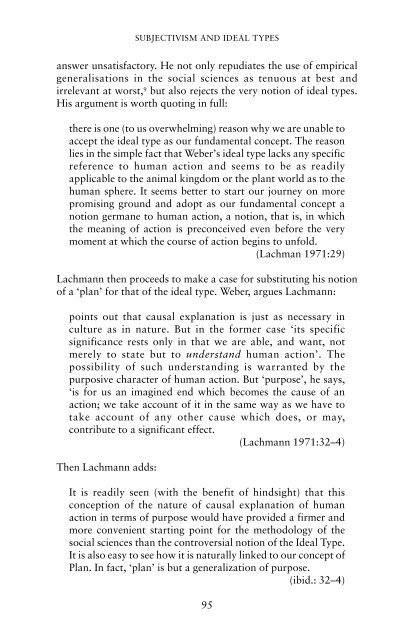Subjectivism and Economic Analysis: Essays in memory of Ludwig ...
Subjectivism and Economic Analysis: Essays in memory of Ludwig ...
Subjectivism and Economic Analysis: Essays in memory of Ludwig ...
You also want an ePaper? Increase the reach of your titles
YUMPU automatically turns print PDFs into web optimized ePapers that Google loves.
SUBJECTIVISM AND IDEAL TYPESanswer unsatisfactory. He not only repudiates the use <strong>of</strong> empiricalgeneralisations <strong>in</strong> the social sciences as tenuous at best <strong>and</strong>irrelevant at worst, 9 but also rejects the very notion <strong>of</strong> ideal types.His argument is worth quot<strong>in</strong>g <strong>in</strong> full:there is one (to us overwhelm<strong>in</strong>g) reason why we are unable toaccept the ideal type as our fundamental concept. The reasonlies <strong>in</strong> the simple fact that Weber’s ideal type lacks any specificreference to human action <strong>and</strong> seems to be as readilyapplicable to the animal k<strong>in</strong>gdom or the plant world as to thehuman sphere. It seems better to start our journey on morepromis<strong>in</strong>g ground <strong>and</strong> adopt as our fundamental concept anotion germane to human action, a notion, that is, <strong>in</strong> whichthe mean<strong>in</strong>g <strong>of</strong> action is preconceived even before the verymoment at which the course <strong>of</strong> action beg<strong>in</strong>s to unfold.(Lachman 1971:29)Lachmann then proceeds to make a case for substitut<strong>in</strong>g his notion<strong>of</strong> a ‘plan’ for that <strong>of</strong> the ideal type. Weber, argues Lachmann:po<strong>in</strong>ts out that causal explanation is just as necessary <strong>in</strong>culture as <strong>in</strong> nature. But <strong>in</strong> the former case ‘its specificsignificance rests only <strong>in</strong> that we are able, <strong>and</strong> want, notmerely to state but to underst<strong>and</strong> human action’. Thepossibility <strong>of</strong> such underst<strong>and</strong><strong>in</strong>g is warranted by thepurposive character <strong>of</strong> human action. But ‘purpose’, he says,‘is for us an imag<strong>in</strong>ed end which becomes the cause <strong>of</strong> anaction; we take account <strong>of</strong> it <strong>in</strong> the same way as we have totake account <strong>of</strong> any other cause which does, or may,contribute to a significant effect.(Lachmann 1971:32–4)Then Lachmann adds:It is readily seen (with the benefit <strong>of</strong> h<strong>in</strong>dsight) that thisconception <strong>of</strong> the nature <strong>of</strong> causal explanation <strong>of</strong> humanaction <strong>in</strong> terms <strong>of</strong> purpose would have provided a firmer <strong>and</strong>more convenient start<strong>in</strong>g po<strong>in</strong>t for the methodology <strong>of</strong> thesocial sciences than the controversial notion <strong>of</strong> the Ideal Type.It is also easy to see how it is naturally l<strong>in</strong>ked to our concept <strong>of</strong>Plan. In fact, ‘plan’ is but a generalization <strong>of</strong> purpose.(ibid.: 32–4)95

















